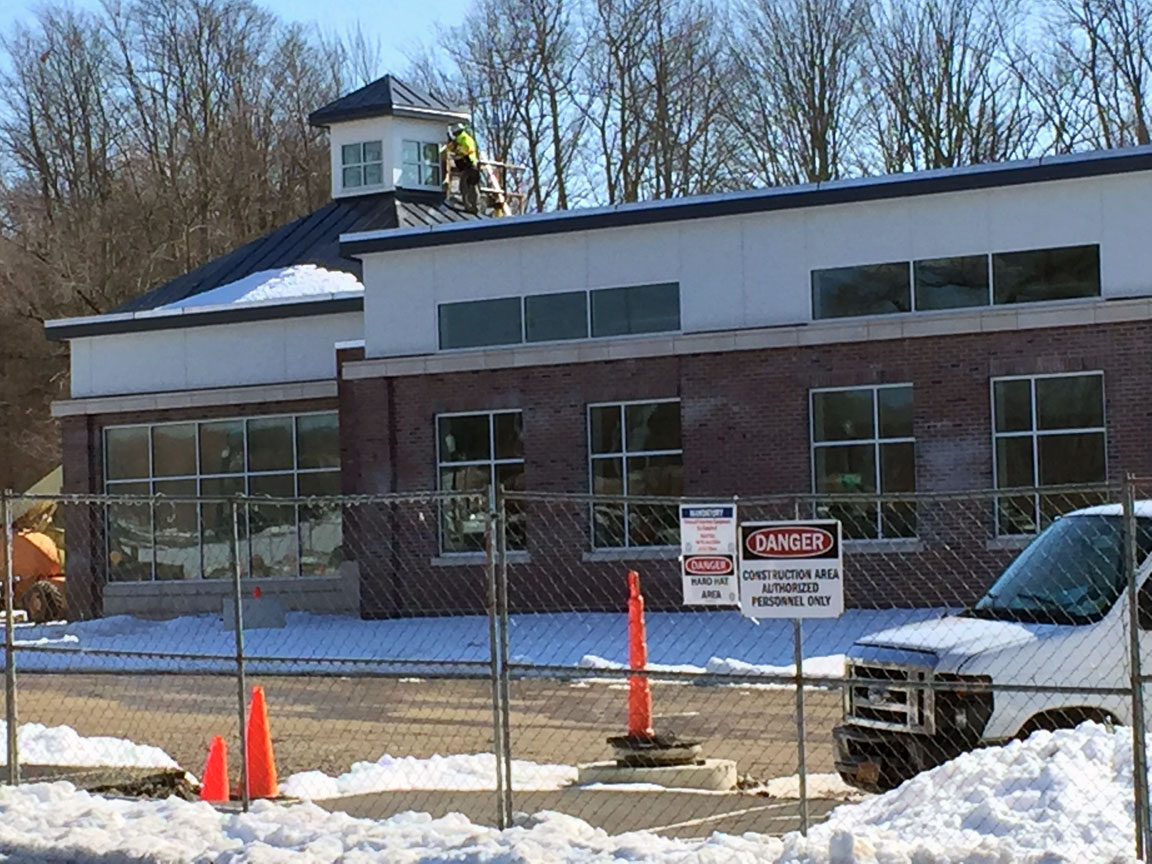Newtown is continuing to make great strides in commercial and economic development, according to First Selectman Dan Rosenthal. And it should continue to do so, if the state will get out of the way.
That is not precisely how Rosenthal put it, but it was very much implied when he spoke with the Business Journal. Among his concerns: Gov. Ned Lamont”™s proposal to shift a significant portion of the cost of teacher pensions to Connecticut municipalities.

Photo by Kevin Zimmerman
The base contribution would be approximately 25 percent of the normal cost, which would be phased in over three years. Newtown would lose $250,000 in 2020, $660,000 in 2021 and $750,000 in 2022 ”” something Rosenthal characterized as “insidious.”
“What I”™m particularly worried about is that we”™ll be paying into a system we can”™t control,” the first selectman said. “Locally we manage our pensions very well. We”™re closing out our defined benefit plan to include existing employees only, with everyone else going to a (tax-deferred retirement savings plan) 401(a).”
What Lamont”™s plan would effectively do would be to force governments “to wait for an email each year to find out how much you owe, and then try to create a budget from there,” Rosenthal said. The likely result would be service cuts.
Rosenthal said he also differs with his fellow Democrat Lamont when it comes to highway tolls and legalization of recreational marijuana as ways to raise revenue. With the former, he compared the plan ”” which supporters claim could raise $800 million to $1 billion in annual revenue ”” to the situation in 1991 when then-Gov. Lowell Weicker signed into law a flat 4.5 percent income tax, which was hoped would help make up for a concurrent decrease in the sales tax from 8 percent to 4.25 percent. Today the income tax rate ranges from 3 percent to 6.99 percent, while the state sales tax sits at 6.35 percent.
“I don”™t believe we ever got down to that 4.25 percent,” Rosenthal said, drawing a comparison between Weicker”™s tax plan and Lamont”™s transportation plan ”” that promises made in Hartford have proven to be difficult to keep.
As for recreational marijuana ”” which the state”™s nonpartisan Office of Fiscal Analysis has estimated Connecticut could reap somewhere in the neighborhood of $61 million a year ”” Rosenthal said he was uneasy about revenue trumping responsibility.
“There”™s a lot of talk about revenue and not enough about revenue realignment,” he said. Having spoken against a proposed medical marijuana dispensary in Newtown ””nearby Bethel already has one ”” Rosenthal said he was opposed to legalizing recreational marijuana because of moral objections.
“I”™m not ready to have that conversation with my kids: ”˜We”™re making marijuana legal because we can collect tax revenue on it ”” but don”™t you smoke it!”™ ” he declared.
In the meantime, various projects around Newtown are continuing to take shape. Construction of its 45,860-square-foot community center, funded by General Electric”™s $10 million gift following the 2012 Sandy Hook massacre and another $5 million from taxpayers, is “about 75 percent done,” he said.
However, there have been some hiccups in that project. Earlier this year came word that some key aspects and/or materials were not included in the center”™s design phase, including various steel structural elements, with the result that some areas have had to be retrofitted at additional expense. Nevertheless, Rosenthal expects the center to be completed near budget and its original completion date of late June/early July.
As do the town”™s offices, the community center lies within its 185-acre Fairfield Hills campus. Rosenthal has made commercial development on the campus a priority. The first such project is Asylum Brewing Co., now under construction in a renovated 9,000-square-foot building. Rosenthal said interest has been shown in several other vacant Fairfield Hills buildings, but that nothing was yet official.
He said he was pleased that no significant vocal opposition to either Asylum or Reverie Brewing Co., which recently opened at 57B Church Hill Road, had been voiced. Such types of businesses “bring in more diverse traffic,” he said, “people who hopefully will also support other local businesses. There was a time not long ago when every new business in town was a pizza place ”” not that there”™s anything wrong with pizza places ”” but we”™re starting to see different types of businesses opening here.”
Also new to town will be an ice arena at the Newtown Youth Academy Sports & Fitness Center, also located in Fairfield Hills. Once set to open in January 2019, Rosenthal said the project was moving forward and could be completed by July. Originally pitched as an additional building, the arena will now fall within NYA”™s original footprint, with indoor basketball and tennis courts being moved within its 77,000-square-foot space to make room.
Earlier this month the town approved a Public Building and Site Commission recommendation to retain Consigli Construction Co. of Pleasant Valley, New York, as the construction manager for Newtown”™s new police station at 191 S. Main St. That Consigli had completed the new Sandy Hook Elementary School, which opened in 2016, on time and under budget made the choice an easy one, Rosenthal said.
The town spent $1.6 million on purchasing the property and has budgeted $13.2 million for construction, he added. The 7.35-acre site includes a 22,318-square-foot, single-story structure and a bordering 4.39-acre site at 61 Pecks Lane, which includes a vacant house. The town plans on renovating the existing main structure and adding a 2,500-square-foot expansion, which would contain holding cells and a secure, controlled entryway, or “sally port.”
On the residential side, work continues at the 180-unit Covered Bridge Apartments complex near exit 9 of Interstate 84. The years-in-the-making Hunters Ridge development at 79 Church Hill Road, near westbound I-84”™s Exit 10 interchange ramps, is at something of a standstill following a number of revised applications by land development firm 79 Church Hill Road LLC.
The latest wrinkle there involves the Hartford-based Shipman & Goodwin law firm, which represented the developer in a lawsuit filed against Newtown”™s Water & Sewer Authority (WSA) last August. While the suit ”” which in part seeks the nullification of some of the WSA”™s conditions regarding an increase in municipal sewage treatment capacity that would be necessary for the project to go forward ”” is still pending, Shipman has withdrawn from the case.
Rosenthal can take credit for that move, having publicly criticized Shipman for representing the LLC and the Newtown Board of Education at the same time. Although not illegal, Rosenthal said that, again, the moral implications weighed too heavily for comfort.
“Our taxpayers pay for 95 percent of the Board of Education”™s expenses, which includes Shipman & Goodwin,” he said. “And then asking those same taxpayers to turn around and pay to defend the lawsuit just didn”™t make sense. They had to pick one or the other.”
He noted that Shipman represents some 100 school boards across Connecticut while also maintaining a significant land use practice around the state. “That”™s fine, more power to them,” he said. “But it wasn”™t going to happen here.”
Rosenthal noted that the town”™s AAA rating was recently reaffirmed by Standard & Poor”™s. Factors included “Very Strong Management,” “Very Strong Economy,” “Strong” budgetary performance and flexibility ”” its available fund balance in fiscal 2018 was 10.6 percent of operating expenditures ”” and “Very Strong” liquidity, with total government available cash at 23.1 percent of total governmental-fund expenditures.




















